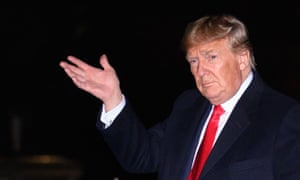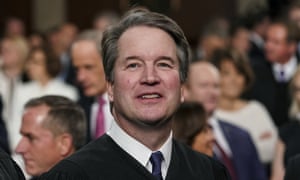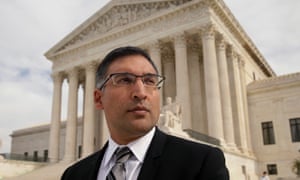He was acting solicitor general under Barack Obama and drew up
regulations used in the Mueller investigation. Now Neal Katyal is
arguing for impeachment
It is the season of impeachment in Washington. As the temperature dips in the nation’s capital and the first frosts arrive, the US Congress
prepares, not for the first time, to break the glass and reach for the
emergency lever provided by the founding fathers for ridding the country
of a miscreant president. The congressional hearings have proved
strangely compulsive viewing. The sight of senior officials sitting
before a microphone addressing a bench of stern, preening, hectoring
members of Congress somehow combines solemnity and glamour in an
archetypal American tableau.
It recalls the great inquisitions of the past: McCarthyism, Watergate, Iran-Contra, as well as Bill Clinton’s impeachment hearings 21 years ago. As the Monica Lewinsky scandal was unfolding, a young lawyer was asked by the Clinton administration to draw up new regulations for the post of special counsel, intended to prevent a recurrence of the Starr report, a vehicle by which the president’s enemies could conduct an untrammelled and lurid excavation of his private life. Those regulations provided the guidelines for Robert Mueller’s investigation into the Trump campaign’s role in Russia’s interference in the 2016 presidential election.
That same lawyer, Neal Katyal, went on to win the 2006 supreme court case that declared the Guantánamo military tribunals a violation of the Geneva convention. Between 2009 and 2011, he became principal deputy solicitor general, then acting solicitor general in the Obama administration. As a measure of his star status in the Washington legal world, he was asked to appear on House of Cards. In a 2015 episode he plays himself, arguing against the administration before the supreme court about drone strikes.
Now 49, he is a professor at Georgetown University in Washington DC and partner in a global law firm. Most recently, he has produced a handbook for the age titled Impeach: The Case Against Donald Trump, and its bright scarlet cover has added a seasonal splash of colour to city bookshop window displays.
Impeach was published late last month, just as the House intelligence committee hearings were winding up and the committee began drafting its 300-page impeachment report – quite a feat considering that the idea of writing it was first suggested to Katyal on 4 October, during a night out with friends. He initially shrugged off the suggestion, insisting he did not have time, only to change his mind later that night.

It recalls the great inquisitions of the past: McCarthyism, Watergate, Iran-Contra, as well as Bill Clinton’s impeachment hearings 21 years ago. As the Monica Lewinsky scandal was unfolding, a young lawyer was asked by the Clinton administration to draw up new regulations for the post of special counsel, intended to prevent a recurrence of the Starr report, a vehicle by which the president’s enemies could conduct an untrammelled and lurid excavation of his private life. Those regulations provided the guidelines for Robert Mueller’s investigation into the Trump campaign’s role in Russia’s interference in the 2016 presidential election.
That same lawyer, Neal Katyal, went on to win the 2006 supreme court case that declared the Guantánamo military tribunals a violation of the Geneva convention. Between 2009 and 2011, he became principal deputy solicitor general, then acting solicitor general in the Obama administration. As a measure of his star status in the Washington legal world, he was asked to appear on House of Cards. In a 2015 episode he plays himself, arguing against the administration before the supreme court about drone strikes.
Now 49, he is a professor at Georgetown University in Washington DC and partner in a global law firm. Most recently, he has produced a handbook for the age titled Impeach: The Case Against Donald Trump, and its bright scarlet cover has added a seasonal splash of colour to city bookshop window displays.
Impeach was published late last month, just as the House intelligence committee hearings were winding up and the committee began drafting its 300-page impeachment report – quite a feat considering that the idea of writing it was first suggested to Katyal on 4 October, during a night out with friends. He initially shrugged off the suggestion, insisting he did not have time, only to change his mind later that night.

Katyal hired a co-writer, Sam Koppelman, a friend’s son who had previously helped him with speechwriting, and together they finished a first draft in two weeks. The publisher was chosen not so much on the size of the advance (Katyal is donating the proceeds to charity) but for speed. In the end, it was printed and distributed in three weeks in the US. The process took a fortnight in the UK.
Impeach is no cliffhanger thriller. The facts of the case are well known. One witness after another has given public testimony, all of which has pointed towards a concerted campaign, orchestrated by Trump and his consigliere, Rudy Giuliani, to pressure a newly elected, inexperienced Ukrainian president, Volodymyr Zelenskiy, into launching an investigation into former vice president Joe Biden, the Democratic presidential frontrunner for 2020, and his son Hunter.
With a resumption of suspended US military aid and a prestigious White House meeting with Trump as incentives, Zelenskiy was also repeatedly asked to announce an inquiry into the allegation that it was Ukraine, not Russia, that had really intervened in the 2016 election. The claim is based on a conspiracy theory propagated for obvious reasons by Moscow. A formal inquiry in Ukraine would give it legitimacy, which together with a Biden investigation could well have provided ammunition for the Trump re-election campaign.
Impeach puts the case against Trump together with lawyerly precision and frames it in the historical context of the founding fathers’ intentions when they drafted the impeachment laws as a remedy to the rise of a would-be tyrant.
With the book now on sale, Katyal has returned to his day job. We talked as he was preparing to argue a death penalty appeal before the supreme court. In a rare bit of good news for human rights advocates, the use of capital punishment is quietly fading away in the US, but it remains on the books in 30 states.
"If – in the face of all the evidence – senators vote to acquit it will at least have been ‘a truth test to see where we are as a society’"
The mat at his front door spells out “welcome” in several languages and scripts, a once-banal gesture towards multiculturalism that has a whiff of resistance to it now that white nativists and supremacists have found their way to the top echelons of US government.
The son of Indian immigrants, Katyal grew up in Chicago and honed his skills in high school and college debating clubs. Sitting at his dining-room table, he palpably enjoys verbal sparring, and rehearsing the virtues of the constitution. The question that really seems to irk him is the one that has hovered over the impeachment proceedings from their outset: what is the point of all the carefully gathered evidence and meticulous constitutional scholarship if the impeachment process itself is skewed?
Republicans in Congress have thus far maintained a solid stance of denial, even at the price of defying the unanimous conclusions of the US intelligence community and common sense. If the votes are conducted on strict party lines, one or more articles of impeachment will be agreed by the House but will fall far short of the 67 Senate votes required for a conviction. Katyal has little time for such fatalism. “One of the things that bothers me so much is that this kind of Republican talking point has dominated the discussion over the last week,” he says. “It’s: Oh well – the Republicans in the Senate are not going to do anything, so therefore this is all a waste of time.”
He has two arguments in response. First, to give up would betray the principles on which the country was built: “This is the most fundamental question we get in a democracy. If we can’t trust our guardians, and if our guardian, in response to an inquiry, says, ‘I don’t have to bother telling you the facts,’ that is incredibly damaging. So I think the questions have to be asked and investigated.” If – in the face of all the evidence – senators vote to acquit it will at least have been “a truth test to see where we are as a society”.
Second, Katyal has not given up hope that Senate Republicans will rediscover their consciences. “Each of them went to Washington with a desire to serve the public,” he argues. “If they wanted to make money or something there are ways to do that. In the heart of this country is a belief in the rule of law.”
He points to the many Republican intellectuals who have taken a stand against the president on principle. Foremost among them is George Conway, a prominent conservative lawyer, leading Trump-baiter on Twitter, and a close friend of Katyal’s who was among the first to encourage him to write the book. Conway is, however, most famous for being married to Kellyanne Conway, Trump’s most aggressively loyal courtier. Fascination with their marriage reached a peak last week when their Twitter feeds collided. Kellyanne tweeted a video of Biden saying something weird about his leg hair with a caption: “Watch: Sleepy Joe is Creepy Joe. We need Ukraine’s help to defeat this guy?” Her husband responded by retweeting with the comment: “Your boss apparently thought so.” Katyal declined to betray any insights into the Conways’ polarised household, other than to observe carefully: “I might as well say for the record, I’ve never met Kellyanne, but George comes over.”
Katyal argues that he is himself “non-partisan”. He acknowledges that he has served in Democratic administrations and donated to Democratic candidates, but he maintains that lawyers have to create rules to govern adversaries and allies alike. That discipline in itself leans towards impartiality. He angered Democrats when he argued in support of confirmation of Trump’s first supreme court justice nominee, Neil Gorsuch. “He would not be my preferred justice were I president,” he said. “But the fact is we lost the election.”
More controversial still, Katyal had supportive things to say about Trump’s next nominee, Brett Kavanaugh, although he is at pains to point out that his comments preceded the testimony of Christine Blasey Ford, who accused Kavanaugh of sexual assault. “The one thing I said is: there is no judge on the court of appeals who I think had done more to advance women law clerks than justice Kavanaugh,” he said. When I ask if he now regrets boosting him in the wake of Blasey Ford’s testimony, Katyal tenses and recites, with lawyerly care: “I haven’t said anything since then.” Asked whether his reticence is due to the fact that part of his job is to argue cases before the bench on which Kavanaugh now sits, Katyal just gives a tight smile.

He does insist, however, that though nominated by Trump, Gorsuch and Kavanaugh are not beholden to him. He recalls that three of the eight justices who voted to release the Watergate tapes for scrutiny were Nixon’s appointments. “I have total faith that – if cases did come to the court involving Trump – that’s how they would be adjudicated,” Katyal says
There are limits to his optimism, however. On many fronts, the Trump administration has simply been ignoring its legal obligations, particularly those towards Congress, in effect refusing to recognise it as a co-equal branch of government. If the president wins re-election next year, it is fair to expect that tendency will deepen.
“The rule of law depends, not just on the text of the law, and not just on institutions, but also on some feeling of good faith by the players. And this president has no good faith,” Katyal says. “There is no question that this president will go down in history as lawless, as fundamentally un-American. I do worry that a second term could really fundamentally destabilise our democracy … That chapter has not been written yet”.
• Impeach: The Case Against Donald Trump by Neal Katyal with Sam Koppelman is published by Canongate (£9.99). To order a copy go to guardianbookshop.com

No comments:
Post a Comment